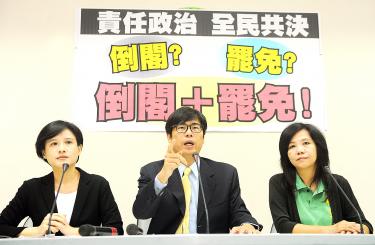Multiple constitutional mechanisms, including a recall of President Ma Ying-jeou (馬英九) and a no-confidence motion against the Cabinet, should be enacted simultaneously to hold Ma accountable for infringing the Constitution and staging political persecutions that have destabilized the country, Democratic Progressive Party (DPP) lawmakers said at a press conference in Taipei yesterday.
DPP Chairman Su Tseng-chang (蘇貞昌) said separately that the party would take whatever action is needed within two weeks if Ma does not apologize for his mistakes and step down.
Su had said on Monday that the measures would be taken at “an appropriate time” and also appealed to Chinese Nationalist Party (KMT) lawmakers to “make the right decision” in supporting the measures.
DPP Legislator Yeh Yi-jin (葉宜津) initiated a proposal for the no-confidence motion against the Cabinet last week and is collecting signatures to back it.
Thirty-three DPP legislators have endorsed Yeh’s proposal and the initiative was five signatures away from meeting the threshold to make it official, the lawmaker said yesterday morning, adding that the passage of the motion is banking on the support of more than a dozen KMT lawmakers.
The initiative should have no problem meeting the threshold — the signatures of more than one-third of the total number of legislators.
The Additional Articles of the Constitution stipulate that 72 hours after a no-confidence motion is filed, an open-ballot vote must be taken within 48 hours. The motion passes if at least half the lawmakers vote in favor of it.
If the motion is passed, the premier is required to resign within 10 days and a legislative by-election must be held no later than 60 days after the president dissolves the legislature.
However, some DPP lawmakers say the no-confidence motion is not the right tactic to adopt at this moment.
DPP Legislator Lee Chun-yi (李俊俋) said that the root cause for the current political stalemate lies in Ma’s vicious and illegal political maneuvers, which were aimed at expanding his presidential power to control the three branches of government.
That is why the legislature should immediately launch a probe into Ma’s alleged misconduct before initiating a recall campaign or a no-confidence motion and “let the public be the judges on the political gridlock,” DPP Legislator Cheng Li-chiun (鄭麗君) said.
Recalling the president would be even more difficult than passing the no-confidence motion, as a recall bid must first be proposed by one-quarter of all legislators, then ratified by two-thirds of all legislators before it is put to a national referendum.
A successful recall requires 50 percent voter support in a referendum and a turnout of more than 50 percent of registered voters.
Separately yesterday, Premier Jiang Yi-huah (江宜樺) was asked to comment on the idea proposed recently by C.V. Chen (陳長文), a lawyer and confidant of Ma’s, that the president dissolve the legislature to break the gridlock.
C.V. Chen made the remarks in an opinion piece published by the Chinese-language China Times on Monday.
Jiang said he respected the right of the legislature to initiate a motion of no-confidence against the Cabinet, adding that he was not in a position to comment on the issue.
The president can only invoke the constitutional right to dissolve the legislature after it passes a no-confidence motion against the Cabinet, Jiang said.
“The right to initiate the mechanism rests with the legislature,” he said.
DPP Legislator Chen Chi-mai (陳其邁) had told the press conference in Taipei that “Ma is the one who initiated the political plot against Legislative Speaker Wang Jin-pyng (王金平) and should be held responsible for his mistake. It does not make sense to instead punish the legislature with a dissolution.”
“You do not punish a white cat when a black cat steals food,” he added.
Source: Taipei Times - 2013/10/02





















